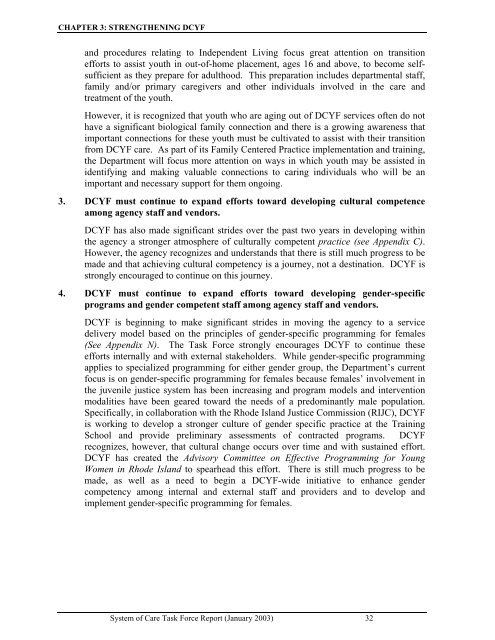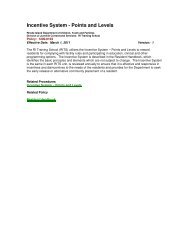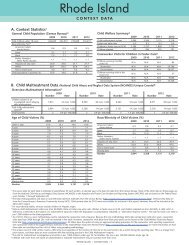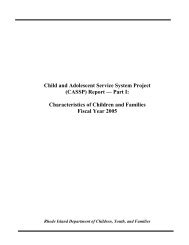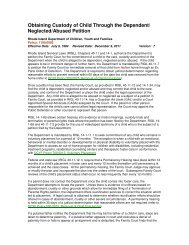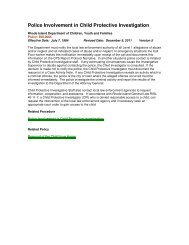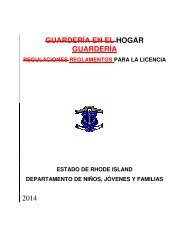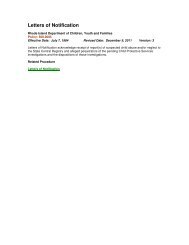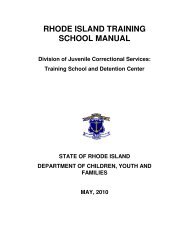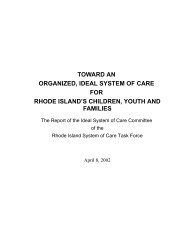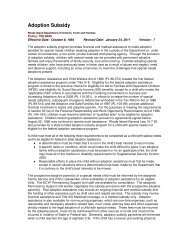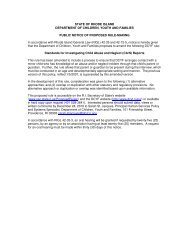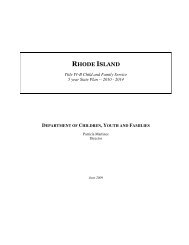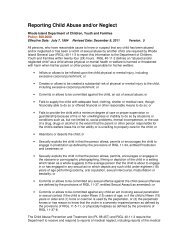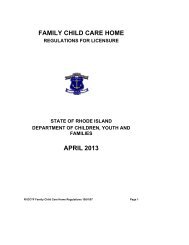Final Report - RI Department of Children, Youth & Families
Final Report - RI Department of Children, Youth & Families
Final Report - RI Department of Children, Youth & Families
You also want an ePaper? Increase the reach of your titles
YUMPU automatically turns print PDFs into web optimized ePapers that Google loves.
CHAPTER 3: STRENGTHENING DCYF<br />
and procedures relating to Independent Living focus great attention on transition<br />
efforts to assist youth in out-<strong>of</strong>-home placement, ages 16 and above, to become selfsufficient<br />
as they prepare for adulthood. This preparation includes departmental staff,<br />
family and/or primary caregivers and other individuals involved in the care and<br />
treatment <strong>of</strong> the youth.<br />
However, it is recognized that youth who are aging out <strong>of</strong> DCYF services <strong>of</strong>ten do not<br />
have a significant biological family connection and there is a growing awareness that<br />
important connections for these youth must be cultivated to assist with their transition<br />
from DCYF care. As part <strong>of</strong> its Family Centered Practice implementation and training,<br />
the <strong>Department</strong> will focus more attention on ways in which youth may be assisted in<br />
identifying and making valuable connections to caring individuals who will be an<br />
important and necessary support for them ongoing.<br />
3. DCYF must continue to expand efforts toward developing cultural competence<br />
among agency staff and vendors.<br />
DCYF has also made significant strides over the past two years in developing within<br />
the agency a stronger atmosphere <strong>of</strong> culturally competent practice (see Appendix C).<br />
However, the agency recognizes and understands that there is still much progress to be<br />
made and that achieving cultural competency is a journey, not a destination. DCYF is<br />
strongly encouraged to continue on this journey.<br />
4. DCYF must continue to expand efforts toward developing gender-specific<br />
programs and gender competent staff among agency staff and vendors.<br />
DCYF is beginning to make significant strides in moving the agency to a service<br />
delivery model based on the principles <strong>of</strong> gender-specific programming for females<br />
(See Appendix N). The Task Force strongly encourages DCYF to continue these<br />
efforts internally and with external stakeholders. While gender-specific programming<br />
applies to specialized programming for either gender group, the <strong>Department</strong>’s current<br />
focus is on gender-specific programming for females because females’ involvement in<br />
the juvenile justice system has been increasing and program models and intervention<br />
modalities have been geared toward the needs <strong>of</strong> a predominantly male population.<br />
Specifically, in collaboration with the Rhode Island Justice Commission (<strong>RI</strong>JC), DCYF<br />
is working to develop a stronger culture <strong>of</strong> gender specific practice at the Training<br />
School and provide preliminary assessments <strong>of</strong> contracted programs. DCYF<br />
recognizes, however, that cultural change occurs over time and with sustained effort.<br />
DCYF has created the Advisory Committee on Effective Programming for Young<br />
Women in Rhode Island to spearhead this effort. There is still much progress to be<br />
made, as well as a need to begin a DCYF-wide initiative to enhance gender<br />
competency among internal and external staff and providers and to develop and<br />
implement gender-specific programming for females.<br />
System <strong>of</strong> Care Task Force <strong>Report</strong> (January 2003) 32


